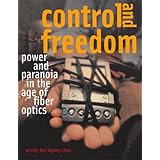
Average Reviews:

(More customer reviews)This theoretically-savvy but nonetheless highly readable book makes a provocative and vital intervention in the field of internet studies. In an engaging romp through topics as diverse as cyberporn, cyberpunk, wecams, globalization, race, TV commercials, TCP/IP, and Schreber's turn-of-the-century delusions, the author argues compellingly that our freedom depends on moving beyond rhetorics of the internet as democratic and/or dangerous. It's a sharp and often stunning analysis that lays bare the ideological stakes of such notions as user-friendliness, protecting children, and techno-Orientalism -- a must-read for anyone interested in media archaeology or cyber-politics.
Click Here to see more reviews about: Control and Freedom: Power and Paranoia in the Age of Fiber Optics
How has the Internet, a medium that thrives on control, been accepted asa medium of freedom? Why is freedom increasingly indistinguishable from paranoidcontrol? In Control and Freedom, Wendy Hui Kyong Chun explores the current politicaland technological coupling of freedom with control by tracing the emergence of theInternet as a mass medium. The parallel (and paranoid) myths of the Internet astotal freedom/total control, she says, stem from our reduction of political problemsinto technological ones.Drawing on the theories of Gilles Deleuze and MichelFoucault and analyzing such phenomena as Webcams and face-recognition technology,Chun argues that the relationship between control and freedom in networked contactis experienced and negotiated through sexuality and race. She traces the desire forcyberspace to cyberpunk fiction and maps the transformation of public/private intoopen/closed. Analyzing "pornocracy," she contends that it was through cyberporn andthe government's attempts to regulate it that the Internet became a marketplace ofideas and commodities. Chun describes the way Internet promoters conflatedtechnological empowerment with racial empowerment and, through close examinations ofWilliam Gibson's Neuromancer and Mamoru Oshii's Ghost in the Shell, she analyzes themanagement of interactivity in narratives of cyberspace.The Internet's potential fordemocracy stems not from illusory promises of individual empowerment, Chun argues,but rather from the ways in which it exposes us to others (and to other machines) inways we cannot control. Using fiber optic networks -- light coursing through glasstubes -- as metaphor and reality, Control and Freedom engages the rich philosophicaltradition of light as a figure for knowledge, clarification, surveillance, anddiscipline, in order to argue that fiber-optic networks physically instantiate, andthus shatter, enlightenment.

0 comments:
Post a Comment